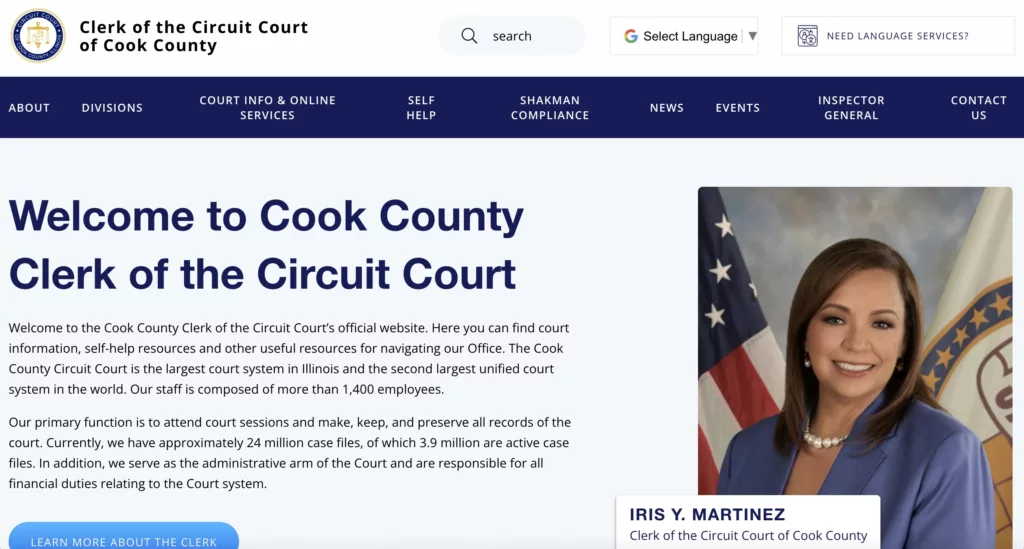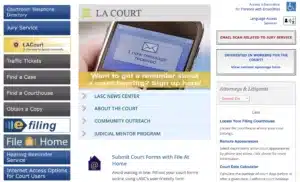Going to court without a lawyer can be intimidating. You may feel lost trying to navigate the complex legal system on your own. But there are resources available to help you represent yourself effectively. One valuable resource is the Cook County Clerk of Court, which oversees the massive Cook County court system.
The Clerk’s website has a wealth of information and services that can assist pro se litigants, or people representing themselves without a lawyer. This blog post will provide an overview of the major sections of the Clerk’s website and how they can help you successfully handle your own case.
About the Clerk’s Office
The first section introduces the Clerk’s office itself. It provides background on the Clerk, Iris Y. Martinez, who was elected to the position. It also shares the office’s mission statement and organizational structure. Understanding the role of the Clerk can help you know what types of services and documents they handle.
The Clerk’s office serves as the administrative arm of the court system. Their duties include:
- Attending court sessions
- Maintaining court records
- Handling financial administration for the courts
So this office is responsible for the paperwork and logistics that keep the court system running. The About section also lists contact information if you ever need to get in touch with the Clerk’s office.
Court Divisions
The next major section outlines the different divisions of the Cook County court system. Cook County courts handle all types of legal cases, which are grouped into divisions based on case type. For example, the Law Division handles personal injury and complex commercial lawsuits. The Chancery Division oversees matters like contract disputes and injunctions.
Knowing which division your case is assigned to can help you find the appropriate courtroom location. It also assists in understanding court procedures specific to your case type. Reviewing your division’s description on the Clerk’s website gives useful context.
Locating Your Courthouse
Another section provides contact information and addresses for the different courthouse locations around Cook County. There are six different districts, spanning from the Daley Center in downtown Chicago to courthouses in the suburbs.
When you receive notice of your court date, it will list which courthouse to report to. You can use the map and listings on the Clerk’s website to identify where you need to go and plan your travel accordingly. This ensures you arrive at the proper courthouse on time for your hearings.
Online Case Lookup
One of the most useful resources the website offers is the ability to look up information on your case online through the Clerk’s Portal. This allows you to track the status of your case from anywhere. All you need is your case number to access the following information:
- Case summary
- Scheduled court dates
- Documents filed
- Rulings made
To access the Clerk’s Portal and look up information on your case online, follow these steps:
- Go to the Cook County Clerk of Court website: https://www.cookcountyclerkofcourt.org
- On the home page, find the “CCC Portal Case Lookup” box on the right side. Click the link that says “CCC Portal”.
- This will take you to the login page for the Clerk’s Portal. If you already have an account, enter your login credentials here.
- If you do not have an account, you will need to register for one. Click on the “Register” link in the top right corner.
- Follow the instructions to create your free account. You will need to provide your name, email address, and create a password.
- Once registered and logged in, you will see a case lookup box. Enter your case number here and click “Search” to pull up your case details.
- The Portal will display your case summary, upcoming court dates, documents filed, and other important information.
Monitoring your case online assists in your ability to represent yourself by staying updated on its progress. However, be aware that the online case information may not reflect very recent activity. It can take a few days for updates to be entered into the system. So utilize other resources like public computer terminals at the courthouse to complement the online lookup.
E-Filing
Many court documents now must be electronically filed through the Clerk’s e-filing system. The website has details on how to register and e-file documents for your case. This includes links and instructions for the statewide e-filing service providers authorized for Cook County.
Learning the e-filing process ahead of time allows you to file motions, responses, and other documents correctly in compliance with court requirements. The Clerk’s website e-filing page explains everything you need to know to utilize this important system effectively.
Court Forms
Representing yourself also requires preparing various court documents and filings. The Clerk’s website has a section to help you access the forms you need. It provides links to:
- Cook County Circuit Court forms – standardized forms specific to Cook County courts, such as the civil cover sheet.
- Illinois Supreme Court forms – state-wide forms used in all Illinois courts for matters like discovery requests and general civil lawsuits.
- Commonly used local court forms – other forms helpful in Cook County courts, such as jury demands.
With easy access to required local and state court forms, you can draft professional, compliant documents for your case. Links to instructions and rules for forms are also available on the Clerk’s website to further assist you in proper preparation.
Language Services
Going to court can be especially challenging for non-English speakers. The Clerk’s website highlights free language services provided by the court system. These include interpreters and translated documents.
Whether you speak Spanish, Polish, Arabic or one of over 200 other languages, these services can help ensure you fully participate in your case. Reviewing the interpretation policies on the Clerk’s website shows you how to request these accommodations.
Court Calendar
Staying on top of important court dates is crucial when self-represented. The Clerk provides a court calendar page detailing scheduled holidays and closures. This helps you avoid missing filing deadlines or appearances.
You can also find printable monthly court calendars. These list day-by-day which judges are hearing which types of cases in each courtroom. Keeping track of the court calendar assists in successfully managing your own case deadlines.
Contact Information
The Clerk’s website makes it easy to find contact information for helpful resources. It provides phone numbers and emails for:
- Clerk’s office general info
- Traffic department
- Criminal department
- Law library
- Office of the Chief Judge
Having direct contacts available allows you to efficiently get assistance or answers to questions that come up in handling your case. No need to search elsewhere on the court system website.
The Clerk’s website also offers a customer service call center number. This connects you with knowledgeable court staff who can answer many questions without you coming into court. They can also take requests for documents and records for your case.
Online Payments
If court fines or fees are ordered in your case, the Clerk’s website offers a way to pay them online. This includes options to resolve certain eligible traffic tickets online as well. Details on how to use the online payment system are provided.
Benefits of Courtroom5 Membership
While the Cook County Clerk of Court website provides many valuable resources for self-represented litigants, navigating your case pro se can still be very difficult. Consider the benefits of a Courtroom5 membership to further help you represent yourself effectively.
With Courtroom5, you gain access to professional tools and support at affordable rates compared to an attorney. A membership provides guidance at every step, including:
- Smart filings and documents tailored to the facts of your specific case
- Coaching from experienced paralegals and lawyers
- Legal experts to assist with discovery, oral arguments, and hearings
- Ongoing training on litigation procedures and rules
Courtroom5 levels the playing field against opposing lawyers. We simplify the process so you can confidently make your case pro se. Learn more and sign up today!



